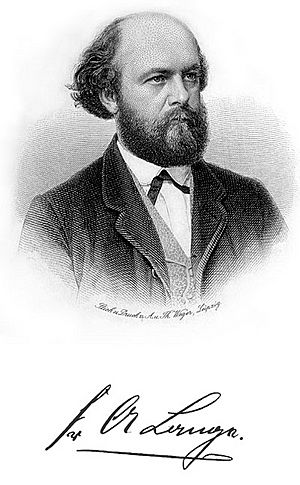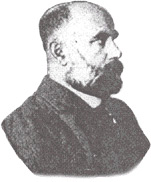Friedrich Albert Lange facts for kids
Quick facts for kids
Friedrich Albert Lange
|
|
|---|---|
 |
|
| Born | 28 September 1828 Wald near Solingen
|
| Died | 21 November 1875 (aged 47) |
| Era | 19th-century philosophy |
| Region | Western philosophy |
| School | Neo-Kantianism |
|
Notable ideas
|
Criticism of Marxist materialism |
|
Influences
|
|
|
Influenced
|
|
Friedrich Albert Lange (born September 28, 1828 – died November 21, 1875) was a German philosopher and sociologist. He thought deeply about how society works and how people understand the world.
His Life Story
Friedrich Albert Lange was born in a town called Wald, near Solingen, Germany. His father, Johann Peter Lange, was a theologian, which means he studied religion.
Lange went to school in places like Duisburg, Zürich, and Bonn. He was very good at his studies, but he also loved gymnastics!
In 1852, he became a schoolmaster (a teacher) in Cologne. A year later, he became a Privatdozent (a private university lecturer) in philosophy at Bonn. In 1858, he became a schoolmaster in Duisburg again. However, he quit when the government told teachers they couldn't be involved in politics.
Lange then started working in journalism. In 1862, he became an editor for a newspaper called Rhein- und Ruhr-Zeitung. He used his writing to push for political and social changes. He often called for the resignation of Otto von Bismarck, a powerful political leader at the time.
Even though he was busy with public affairs, Lange wrote many important books. These included Die Arbeiterfrage (about the "worker question") and Geschichte des Materialismus (a history of materialism). He also wrote about teaching and psychology.
In 1863, Lange supported a socialist leader named Ferdinand Lassalle in a big court case. This case was about protecting academic freedom. From 1864 to 1866, Lange was part of the leadership for an early German labor organization. A famous leader named August Bebel described Lange as a kind and strong person with "magnificent eyes."
In 1866, Lange moved to Winterthur, Switzerland, because he was unhappy with things in Germany. There, he worked for a democratic newspaper. In 1869, he became a Privatdozent in Zürich, and the next year he became a professor of philosophy. He also helped write the constitution for the Canton of Zurich, which included "direct democratic" ideas like referendums.
Sadly, Lange started to get sick while in Zürich. In 1872, he became a professor at the University of Marburg. He is sometimes seen as a founder of the Marburg School of neo-Kantianism. This was a new way of understanding the ideas of the philosopher Immanuel Kant.
Lange did not agree with Marxist materialism, but he still influenced the German Social-Democratic movement. He believed in a kind of socialism based on ethics and gradual reform. He especially influenced Eduard Bernstein, a leader who said, "Kant, not cant," meaning he preferred Kant's ethical ideas over strict Marxist ones.
Lange's health got worse, and he died in Marburg in November 1875. His book Logische Studien (Logical Studies) was published after his death. His main work, Geschichte des Materialismus, argued that understanding materialism clearly helps you see its flaws.
Today, there's a school named after him, the Friedrich-Albert-Lange-Gesamtschule, in his hometown of Wald.
What He Believed In
Lange followed the ideas of Immanuel Kant, who believed that we can only truly know things as they appear to us (called phenomena). Because of this, Lange thought that neither materialism (the idea that only matter exists) nor any other big metaphysical system could claim to be the absolute truth.
However, he did think that materialism was useful for scientific knowledge because it uses exact methods. He also believed that ideal metaphysics, even if not completely true, were valuable because they showed people's hopes and dreams, much like poetry or religion.
In his book Logische Studien, Lange tried to rebuild formal logic. His main idea was that reasoning works best when it can be thought of in terms of space. His book Arbeiterfrage supported a type of socialism. It spoke out against the selfishness of industry at the time and against organizing businesses based on the Darwinian idea of "struggle for existence."
His Political Actions
Lange was a well-known political activist. He often spoke out for peaceful social change in Germany. He strongly supported workers' rights and women's suffrage (the right for women to vote). This was during a time when many labor movements were starting in Germany.
Lange believed that workers' unions were a very important step toward creating a fair and equal society. When he was 20, he joined the Social Democratic Party of Germany (SPD). He quickly became important in the party because he was dedicated to making workers' lives better and improving their education. He stayed a key part of the SPD until he died at age 47.
Lange always believed in peaceful reform and argued against using violence. Many revolutionaries at the time disagreed with him, but he stuck to his ideals. This helped him gain many supporters who believed in his idea of a peaceful revolution.
Before joining the SPD, Lange was a member of the General German Workers' Association (ADAV). This group was started by Ferdinand Lassalle. Lange and Lassalle often debated their different ideas about how much the government should help with social change.
Lange was a main editor for the ADAV's newspaper. This allowed him to share his views on socialism and discuss the group's goals. He strongly believed the government had the power to help with the revolution and remained against violent methods. During his time as an editor, he helped create trade unions. These unions became a key part of the growing socialist movement in Germany. In 1865, Lange left the ADAV. He felt the group had become too controlling and focused on Lassalle's ego.
In 1848, when Lange was just 20, he was very involved in the revolutionary uprisings happening across Europe. He supported workers who were demanding political reform and freedom from the Prussian monarchy. At this time, Lange actually believed that revolutionary violence was needed to create a fair society. However, after the revolution failed, he changed his mind.
He was encouraged to leave Germany because of his role in the revolution. He continued to write about German socialist reform while living in Switzerland. His ideas came from both socialist and liberal ways of thinking.
After changing his mind about violence, Lange focused on helping the working class in a new way. He believed that the biggest problem for workers was that they couldn't afford to live on their low wages.
Lange spent a lot of time studying the ideas of Thomas Robert Malthus. Malthus believed that increasing food availability was the most important step to help the working class. He thought the main problem was the struggle just to survive. Malthus's ideas were often seen as supporting capitalism and were not popular in Germany. However, Lange understood Malthus's argument in a unique way. He concluded that improving the living conditions of the lower class needed a basic change in the legal system. He believed that people in higher classes, especially those in government, had a responsibility to listen to the demands of the working class. He thought they should improve living standards through slow, peaceful reforms based on good arguments.
His Books
- 1855: On the Connection Between the Educational Systems with the Dominant World Views of Different Eras.
- 1862: The Position of the School in Relation to Public Life.
- 1863: Physical Exercise: A Presentation of the History and Essence of Gymnastics in its Pedagogical and Cultural-Historical Significance.
- 1865: The Labour Question in its Present and Future Significance.
- 1865: Foundations of Mathematical Psychology. Attempt at a Demonstration of the Fundamental Error of Herbart and Drobisch.
- 1866: History of Materialism and Critique of its Present Significance.
- 1877: Logical Studies. A Contribution to the New Foundation of Formal Logic and Cognitive Theory.
See also
 In Spanish: Friedrich Albert Lange para niños
In Spanish: Friedrich Albert Lange para niños
 | Jessica Watkins |
 | Robert Henry Lawrence Jr. |
 | Mae Jemison |
 | Sian Proctor |
 | Guion Bluford |


